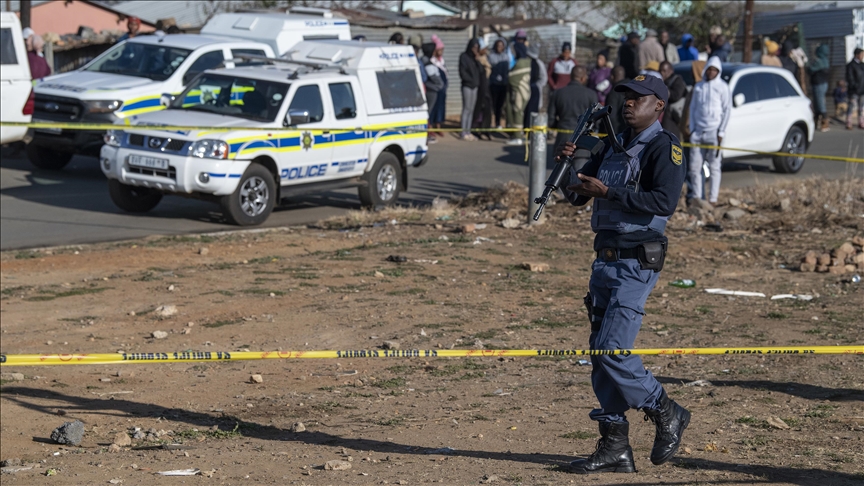U.S. Senate Calls For NATO Help In Iraq
Under Secretary of Defense for Policy Douglas Feith told a think tank here Monday, July 7, that more than 45 nations have made offers of military support "for security and stability operations" in Iraq.
He said 18 countries currently have military capabilities on the ground in the occupied nation, ranging from full combat divisions to field hospitals.
Britain and Poland have formally agreed to lead multinational divisions that will help the United States establish security in Iraq, and according to Feith, other countries are considering joining them.
"And still other countries have indicated their willingness to participate in peacekeeping, in some cases by contributing units from their national police forces, such as Italy’s ‘carabinieri,’" the defense under secretary boasted in a speech before the Center for Strategic and International Studies.
Powell said he was sure that "a number of other nations" will be joining the United States and Britain in Iraq, but would not confirm any of the figures.
And, he cautioned against illusions about the amount of help the administration of President George W. Bush and its allies could count on.
"The guts of the work will still have to be done by the United States, Great Britain and the original members of the coalition," conceded the secretary of state.
The discordant notes came as the number of U.S. soldiers killed in hostile action in Iraq since May 1, when Bush declared an end to major combat operations, reached 31, and calls for foreign help in the U.S. Congress were brought to a fever pitch.
Seeking NATO, U.N. Support in Iraq
Earlier Thursday, the U.S. Senate unanimously passed an amendment to a foreign aid bill containing an appeal to the White House to "formally and expeditiously" consider requesting a NATO peacekeeping force for Iraq.
In a 97-0 vote, the senators said President George W. Bush "should consider requesting formally and expeditiously that NATO raise a force for deployment in post-war Iraq similar to what it has done in Afghanistan, Bosnia and Kosovo."
The amendment was authored by Senators Joe Biden of Delaware, Carl Levin of Michigan, Tom Daschle of South Dakota and Edward Kennedy of Massachusetts — all Democrats — and came during deliberations to fund U.S. overseas operations for the coming fiscal year.
Shortly after the vote, senior Democrats in the U.S. Senate held a press conference denouncing U.S. policy in Iraq, calling on the U.S. administration to end its quarrel with France and Germany and to ask foreign reinforcements to back up U.S. troops currently in Iraq.
‘Dead Flat Wrong’
The White House policy in Iraq is "just dead flat wrong," said Senator Joseph Biden, top Democrat on the Senate Foreign Relations Committee.
The measure also called for U.N. troops and expertise in the operation.
Biden said it was time U.S. officials made up with Paris and Berlin — prime opponents of the U.S. led war in Iraq — in order to demonstrate "a measure of maturity."
"It’s childish," Biden said, at a press briefing.
"There’s a need to internationalize this and to bring in NATO in particular," he said adding that he supports the addition of U.N. forces in Iraq as well.
Getting extra forces in Iraq is in Washington’s best interest, Biden said.
"We need more forces … and we have to make it clear that we’re not a force of occupation," he said.
Internationalization is increasingly seen as a way of not only defraying the mounting cost of U.S. military occupation of Iraq, but stemming the daily attacks U.S. soldiers there have encountered.
But the Bush administration has so far allowed very limited foreign involvement, while Democrats are pushing for a much more robust foreign presence in Iraq.
Senator Carl Levin, top Democrat on the Senate Intelligence Committee said it was "a mystery" why the Bush administration had not made a formal request to the North Atlantic Treaty Organization for a sizeable troop deployment in Iraq.
Asking for NATO help is long overdue, Levin said.
"This is not weakness, it’s wisdom," he said.
"It’s important, it’s critically important, that we reach out to the international community, that we internationalize this effort," Levin said in a television interview.
He expressed the hope that German soldiers with NATO insignia would not be targeted in Iraq with the same ferocity as their American counterparts.
But a report published Thursday in the newspaper USA Today poured cold water on expectations of quick foreign help, saying many nations were "balking" at jumping into the Iraqi cauldron with both feet.
It said India, Pakistan and Portugal, which the Pentagon had hoped would deliver between 25,000 and 30,000 soldiers, were now insisting that the United Nations approve a U.N. mandate for the force first.
In the meantime, Portugal was ready to send just 120 paramilitary police rather than regular soldiers, according to the report.
Asked to comment on the account, Powell issued no denial, saying instead, "Well, we are working with a number of allies who have made commitments."
A number of countries approached by the United States have also expressed reservations about their troops serving under U.S. command, according to defense officials.
Iraq Problems Stack Up For Bush
Meanwhile, the near daily deaths of Americans soldiers, the lack of weapons of mass destruction and the cost of the Iraq conflict are taking a toll on the administration of President George W. Bush.
With problems mounting on the ground in Iraq after what once seemed a clear-cut victory, and opposition Democrats back home slamming lack of evidence on weapons of mass destruction, a poll also showed Thursday that Americans’ disenchantment with their government’s war on Iraq is growing.
Less than half U.S. citizens now believe the United States is in control in Iraq, according to a CBS News poll. And just over half think removing Saddam Hussein from power was worth the cost.
Only 45 percent of those asked said they thought the U.S. was in command on the ground, compared with 71 percent in April.
In early May, shortly after Saddam’s ouster, 65 percent of Americans said they thought the war was worth the cost. Today, the figure is 54 percent.
Some 55 percent said they thought weapons of mass destruction (WDM) would eventually be found in Iraq — down from 44 percent last month.
And Defense Secretary Donald Rumsfeld said Wednesday the cost of operations in Iraq had soared to some 3.9 billion dollars a month, double April’s estimates.
Opposition Democrats meanwhile stepped up criticism of the president and calls for an inquiry into the intelligence used to justify the war.
"It’s time for the president to step up and tell the truth, that the war is continuing and so are the casualties," Senator John Kerry, a leading contender for the Democratic nomination for next year’s presidential election, said Thursday.
Kerry said Bush should admit that there are not enough troops in Iraq.
"I’m now concerned that we have the world’s best-trained soldiers serving as policemen in what seems to be a shooting gallery," added Senator Edward Kennedy, another Democrat.



